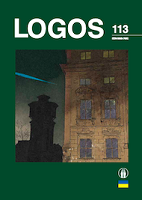Lithuanian-Ruthenian Chronicle Paradigm of Thinking in the Late Middle Ages
Lithuanian-Ruthenian Chronicle Paradigm of Thinking in the Late Middle Ages
Author(s): Oksana SlipushkoSubject(s): Aesthetics, Philosophy of Middle Ages, Theory of Literature, Sociology of Literature
Published by: Visuomeninė organizacija »LOGOS«
Keywords: Western Ruthenian chronicles; Late Middle Ages; Lithuanian Ruthenian State; discourse;
Summary/Abstract: This article is devoted to the analysis of the ideological context, historical mission and paradigm features of Lithuania, Belarus, Kyiv Rus, and their chronicles, which were formed by the memoirs written in the Late Middle Ages. The emphasis is made on the historical mission of chronicles and their reception in the social space of the era. The article examines the changes in anthropological understanding regarding the development of literature in Lithuanian-Ruthenian state. It also focuses on the modern vision of the role of Western Ruthenian chronicles in the development of late medieval European culture and literature. The main dominant features of the texts that contributed to the integration of the Ruthenian discourse into the cultural space are determined. The literature of the Late Middle Ages, styles, genres, spiritual and aesthetic dominants, religious vectors of thinking, have been studied in this work. The role of the Belarusian-Lithuanian Chronicles in the process of formation of national, political and cultural lines of the Lithuanian-Ruthenian state is highlighted. The paradigm of annalistic thinking is defined as the system performing socio-political, historical, cultural-literary, artistic, and aesthetic functions. The political role of Lithuania and cultural dominant of Rus are harmoniously synthesized. During the Late Middle Ages, the Belarus-Lithuanian Chronicles and the Short Kyiv Chronicle became the continuation of the Ruthenian Chronicle. They show a literary and social-historical tradition, an awareness of Ruthenian, which at that time was part of the Lithuanian-Ruthenian state, as a legacy of the state of Kievan Rus and the newly created part of it.
Journal: LOGOS - A Journal of Religion, Philosophy, Comparative Cultural Studies and Art
- Issue Year: 2022
- Issue No: 113
- Page Range: 18-25
- Page Count: 8
- Language: English

